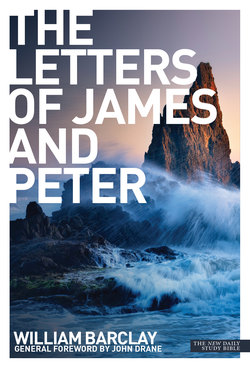Читать книгу New Daily Study Bible: The Letters to James and Peter - William Barclay - Страница 32
На сайте Литреса книга снята с продажи.
ОглавлениеTHE ROYAL LAW
James 2:8–11
If you perfectly keep the royal law, as the Scripture has it: ‘You must love your neighbour as yourself’, you do well. But if you treat people with respect of persons, such conduct is sin and you stand convicted by the law as transgressors. For, if a man keeps the whole law and yet fails to keep it in one point, he becomes guilty of transgressing the law as a whole. For he who said ‘Do not commit adultery’ also said ‘Do not kill’. If you do not commit adultery but kill, you become a transgressor of the law.
THE connection of thought with the previous passage is this. James has been condemning those who pay special attention to the rich man who enters the church. ‘But’, they might answer, ‘the law tells me to love my neighbour as myself. Therefore we are duty-bound to welcome this man when he comes to church.’ ‘Very well,’ answers James, ‘if you are really welcoming the man because you love him as you do yourself, and you wish to give him the welcome you yourself would wish to receive, that is fine. But, if you are giving him this special welcome because he is rich, that is favouritism and that is wrong – and, far from keeping the law, you are in fact breaking it. You don’t love your neighbour, or you would not neglect the poor man. What you love is wealth – and that is not what the law commands.’
James calls the great commandment to love our neighbour as ourselves the royal law. There can be various meanings of the phrase. It may mean the law which is of supreme excellence; it may mean the law which is given by the King of Kings; it may mean the supreme law; it may mean the law that gives the regal quality to people and is fit for royalty. To keep that greatest law is to become king of oneself and a king among others. It is a law fit for those who are royal, and able to make others royal.
James goes on to lay down a great principle about the law of God. To break any part of it is to become a transgressor. The Jews were very apt to regard the law as a series of detached commandments. To keep one was to gain credit; to break one was to incur debt. People could add up the ones they kept and subtract the ones they broke and so emerge with a credit or a debit balance. There was a Rabbinic saying: ‘Whoever fulfils only one law, good is appointed to him; his days are prolonged and he will inherit the land.’ Again, many of the Rabbis held that ‘the Sabbath weighs against all precepts’, and to keep it was to keep the law.
As James saw it, the whole law was the will of God; to break any part of it was to infringe that will and therefore to be guilty of sin. That is perfectly true. To break any part of the law is to become a transgressor in principle. Even under human justice, people become criminals when they have broken one law. So James argues: ‘No matter how good you may be in other directions, if you treat people with favouritism, you have acted against the will of God and you are a transgressor.’
There is a great truth here which is both relevant and practical. We may put it much more simply. Men and women may be in nearly all respects good people, and yet they may spoil themselves by one fault. They may be moral in their action, pure in their speech, meticulous in their devotion. But they may be hard and self-righteous, rigid and unsympathetic, and, if so, their goodness is spoiled.
We do well to remember that, though we may claim to have done many good things and to have resisted many evil things, there may be something in us by which everything is spoiled.
